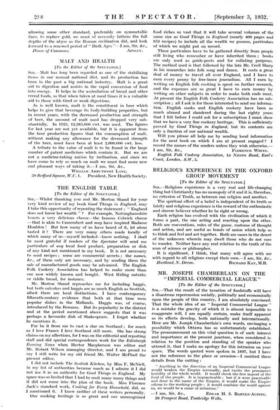THE ENGLISH TABLE
[To the Editor of the SPECTATOR.] Sin,—Whilst thanking you and Mr. Morton Shand for your very kind review of my book Good Things in England, may I take this opportunity of repeating the statement : " England does not know her wealth " ? For example, Nottinghamshire boasts a very delicious cheese—the famous Colwick cheese —that is akin to Camembert and may have inspired Madame Houblon ! But how many of us have heard of it, let alone tasted it ? There are very many others made locally of which many of us—myself included—know nothing. I shall be most grateful if readers of the Spectator will send me particulars of any local food product, preparation or dish of any kind not mentioned in my book. It is not necessary to send recipes ; some are commercial secrets ; the names, &c., of them only are necessary, and by sending them the sale of manufactured goods may be advanced. The English Folk Cookery Association has helped to make more than one now widely known and bought. West Riding oatcake or riddle bread, for instance.
Mr. Morton Shand reproaches me for including haggis, but both oatcakes and haggis are as much English as Scottish, albeit there arc local distinctions. I have contemporary fifteenth-century evidence that both at that time were popular dishes in the Midlands. Haggis was, of course, introduced by the Romans. But its popularity in the district and at the period mentioned above suggests that it was perhaps a favourite dish of Shakespeare. I forget whether he mentions it.
Far be it from me to cast a slur on Scotland ; for much
as I love France I love Scotland still more. She has strong claims on my affections, for I was on the editorial and reporting staff and did special correspondence work for the Edinburgh Evening News when Hector Macpherson was editor and Mr. Robert Wilson managing director, and I am proud to. say I still write for my old friend Mr. Walter McPhail the present editor.
I did not include The Scottish Kitchen, by Miss F. MeNiell, in my list of authorities because much as I admire it I did not use it as an authority for Good Things in England. My space was so limited that I had to omit many many things and it did not come into the plan of the book. Miss Florence. Jack's standard work, Cooking for Every Household, did, so I:mentioned it. I know neither of these writers personally.
Our cooking heritage is so great and our unrecognized
food riches so vast that it will take several volumes of the same size as Good Things in England (nearly 4,00 pages and 853 recipes) to include all the wealth we possess, particulars of which we might put on record.
These particulars have to be gathered directly from people still living who remember or have inherited them ; books are only used as guide-posts and for collating purposes. The method used is that followed by the late Mr. Cecil Sharp in his researches into folk song and dance. It costs a great deal of money to travel all over England, and I have to earn every penny by free-lance journalism. All I earn by writing on English folk cooking is spent on further research, and the expenses are so great I have to earn money by writing on other subjects in order to make both ends meet. At present the English Folk Cookery Association has no sub- scription ; all I ask is for those interested to send me informa- tion. English cooks and English cookery have been so much abused and slandered during the last eighty years that I felt before I could ask for a subscription I must show that we have a very fine cookery heritage. This is sufficiently proved by Good Things in England, but its contents are only a fraction of our national wealth.
Will you please all help me by sending local information for the next book on which I am at present engaged ? I record the names of the senders unless they wish otherwise.— I am, Sir, &c., FLORENCE WHITE. English Folk Cookery Association, la Never Road, Earl's Court, London, S.W. 5.






























 Previous page
Previous page